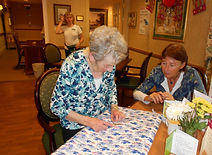

30 Activities
for hospital, hospice or nursing home visits
For those who are ill or who have dementia

Many people visiting sick or elderly relatives, friends or neighbours are unsure
what to do and say. Here are some suggestions to help you make visits more
enjoyable for everyone…
-
Bring a newspaper or magazine (preferably tabloid size for ease) and look at it together.
-
Think of an amusing anecdote to recount of something that’s happened since your last visit.
-
Take some flowers and encourage the person you’re vising to arrange them in a vase, assisting as necessary. Talk about the names and colours of the flowers.
-
Autumn leaves are also something to bring from outdoors that can be of interest.
-
Do something simple related to a hobby the person has/had e.g. puzzle, stamp album, sewing, crochet, knitting, gardening (e.g. plant a bulb in a pot).
-
Take a favourite food (subject to medical restrictions). Chocolate buttons are great for those experiencing swallowing difficulty as they melt in the mouth. Ice cream brought in a cool bag is often popular.
-
Get a tea, coffee or cold drink for you both to have together.
-
Visit at a meal time and sit with the person, help them to eat if that would be acceptable.
-
Read to the person from a book. Perhaps you can read a chapter or a poem each time you visit.
-
Listen to an audio book together, using headphones if appropriate.
-
Look at a “picture”/coffee table type book together e.g. royal family, countryside, buildings.
-
Look at photos together of family, friends, favourite places, holidays, old photos from earlier years.
-
Wedding photos are often particularly special and you may be able to identify relatives and friends together.
-
Look at recent letters and cards that have been sent and read the messages out.
-
Read a diary or letters from the past.
-
A holiday journal and looking at the relevant holiday photos can be particularly fun, recounting the memories.
-
Play some favourite music: classical, pop or spiritual. Music seems to resonate well with people with dementia and often makes them more alert and communicative. One or both of you may like to sing along if you are somewhere where it won't disturb others.
-
Do something devotional:
-
Read a bible passage: a favourite, something encouraging or calming. The Psalms are particularly good.
-
Offer to sing a hymn or spiritual song: they may like to join in.
-
Play a hymn on a kindle, smartphone or similar device.
-
Read hymns and ask them to choose their favourites.
-
Offer to pray for the person.
-
Pray a blessing over them.
-
Combine these into a little service.
-
-
Watch a TV program together, especially something they enjoy eg sport, Songs of Parise, a serial.
-
Listen to a brief radio programme together. You could use BBC Sounds for one previously broadcast.
-
Offer to wipe their face and hands with a warm damp flannel (take a flannel soap & towel with you in case they aren't readily available).
-
Offer a manicure/hand massage (take a flannel, towel, nail clippers & hand cream with you).
-
Rub body lotion gently into arms or legs (having sought permission first!)
-
Hold a hand or stroke a hand, arm or brow. Touch can be very soothing and comforting.
-
Use your mobile to phone a friend. Even if the person can’t speak hearing a familiar voice will be an encouragement. Using speaker phone may help so you can both hear the conversation.
-
Skype or Zoom a relative or friend who lives at a distance so they can see them.
-
Go & sit somewhere together where you can watch the world go by: near an entrance or communal area.
-
Go for a wheelchair ride:
-
Round the building.
-
In the grounds/garden.
-
To the care home/hospital café or communal lounge.
-
-
If practical and allowed go out for a country drive (or even a town drive). The change of scene can be a real tonic. Talk about what you can both see.
-
Taking a smartphone, kindle, tablet or iPad can be very useful for photos, music, books etc.
Signposts
Other resources in this series include:
-
Faith in Later Life https://faithinlaterlife.org/resource-hub/
Author & copyright: Helen Calder 2019